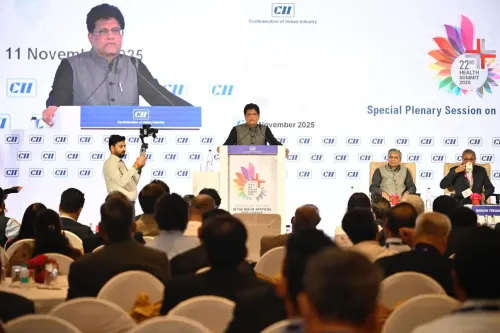Is the K-Culture Boom Driving South Korea's Consumer Goods Exports?

Synopsis
Key Takeaways
- Government plans a comprehensive export strategy.
- Focus on Korean food, beauty, and fashion products.
- Strategies to overcome export hurdles.
- Emphasis on establishing global online marketplaces.
- Potential for economic growth through new export engines.
Seoul, Nov 12 (NationPress) The government is set to unveil a comprehensive strategy aimed at enhancing South Korea's exports of consumer goods this year, responding to the increasing global appetite for Korean food, beauty, and fashion products, according to the trade ministry on Wednesday.
During a meeting with key Korean companies involved in manufacturing and distributing consumer goods, including the online fashion platform Musinsa, the e-commerce giant Coupang Inc., and leading health and beauty retailer CJ Olive Young, Trade Minister Yeo Han-koo presented the forthcoming plan, as reported by the Yonhap news agency.
The meeting focused on strategies to elevate the country’s consumer goods exports, aligning with the surge in Korean culture's popularity, as stated by the Ministry of Trade, Industry and Resources.
The upcoming strategy is expected to introduce initiatives that will assist Korean products in penetrating global markets with a premium approach, tackle export-related challenges such as logistics and certification, and establish global online marketplaces for Korean goods.
“Our distribution platforms serve as crucial bridges connecting international consumers with Korean products,” Yeo remarked, emphasizing that consumer goods could evolve into a new growth engine for the nation's exports, which have mainly concentrated on semiconductors, automobiles, and other industrial products.
In related news, Industry Minister Kim Jung-kwan met with Qatar's energy minister on Wednesday in Seoul to explore opportunities for bilateral cooperation in energy supply chains, plant construction, and shipbuilding.
During discussions with Saad bin Sherida Al Kaabi, Qatar's state minister for energy affairs, both sides exchanged insights on Qatar's plans to boost liquefied natural gas (LNG) production and enhance supply chain collaboration, as per the Ministry of Trade, Industry and Resources.
Qatar stands as one of South Korea's key LNG partners, with Seoul importing 4.87 million tons of natural gas from the Middle Eastern nation in the first eight months of this year, marking the second-largest volume of LNG received from a single country.
The ministers also concurred on strengthening mutually beneficial cooperation in plant construction and shipbuilding, aiming to initiate joint projects in these sectors.
Qatar ranked fifth in Korea's overseas plant orders between January and September, with total contracts amounting to US$2.79 billion.









